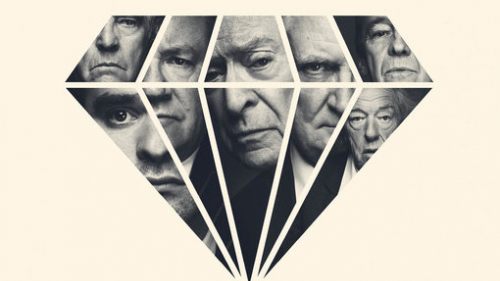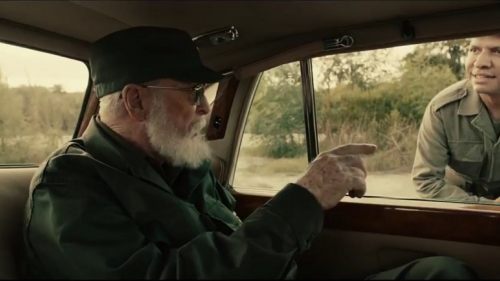Movie Review: YOUTH Is Like Hanging With Your Sad Grandpa For Two Hours
Don’t let the title of Paolo Sorrentino’s new film fool you: he’s playing coy.Youth is not about young people at all, but rather a pair of sad old wrinklies who sit around at a spa mourning the loss of their youth, as well as the divisions between parents and their children, the death of the movies, the toil of making art, boredom, apathy, depression, and any number of other disparate themes. Basically, Sorrentino used the spaghetti wall test to pick his ideas without bothering to discard any undercooked strands of pasta.
The experience isn’t entirely unpalatable. Even a bad Sorrentino film is generally more exciting than most of the films being output by his contemporaries, if only on visual merits. Few filmmakers know how to compose a shot or execute a visual aria quite like Sorrentino, who speaks with his camera the way that Youth’s lead, Fred Ballinger (Michael Caine), speaks with his hands. Fred is a retired conductor, a maestro, according to the unctuous, twitchy emissary to Queen Elizabeth who he meets at the start of the film; the man has arrived in the Swiss Alps, where Fred is vacationing at a luxury resort so nice that “luxury” scarcely describes it, to request that Fred perform one of his most popular compositions at Prince Philip’s birthday. The film circles back around to Fred’s reply of “no” several times throughout its running time.
Ostensibly, his polite refusal of the Queen’s petitions gives Youth its through line. If only that were true. Fred spends much of the picture musing and moping; he commiserates with his longtime friend, Mick Boyle (Harvey Keitel), who is staying at the resort and hashing out the script for his latest film with a pack of young screenwriters; he connects with his daughter, Lena (Rachel Weisz), who stays at the resort after her fiancé, who happens to be Mick’s son, abruptly breaks off their engagement to shack up with a pop star, played by Paloma Faith, playing herself; he chats up Jimmy Tree (Paul Dano, in the role of his career as a respectable Actor™), a movie star chiefly recognized for portraying a robot in a sci-fi film. Off in the margins, a Buddhist monk levitates in meditation, a grandly overweight Diego Armando Maradona juggles a tennis ball with his feet, and the newly crowned Miss Universe dazzles male admirers with her wit and her unshakeable comfort in the flawlessness of her figure. So, really, just your standard issue, endearing Italian weirdness.
Calling the film “loose” would be the understatement of the year. Youth is a free form, plotless effort, much like Sorrentino’s 2013 Best Foreign Language Film winner The Great Beauty. But that film had fire where Youth has coals. In the intervening years between then and now, Sorrentino’s passion appears to have cooled significantly; had he made Youth twenty years hence, it would make a better fit into his filmography. In 2015, it just feels like an anomaly. Has success given Sorrentino that much cause to look in the rearview and contemplate his artistic accomplishments and weigh the worth of his existence? Youth is an older man’s film: it’s a sumptuous lament to how much we shed of ourselves over the course of living. Maybe it’s disingenuous for a man in his 40’s to make existential cinema this lugubrious, but in fairness, Sorrentino has been making movies of reflective intent for years, from The Consequences of Love, where doomed businessman Titta spares his final thought for a long-lost chum, to Il Divo, which is structured as a reminiscence of Giulio Andreotti; in This Must Be the Place, Sorrentino takes Sean Penn Nazi hunting, while The Great Beauty considers Italy’s present through its past while remaking Federico Fellini’s masterpiece, La Dolce Vita, in reverse.
But these films have emotional focal points that lend them each a prevailing cohesion. In particular, The Great Beauty is fueled by Sorrentino’s seething ire; that movie is shot through the lens of Silvio Berlusconi’s Italy, a glitzy, debauched playground for Rome’s self-indulgent elite class, bereft of morality or substance. Youth’s melancholy is arguably its glue, but Sorrentino’s screenplay is all over the place. His characters never talk about the same thing on an atomic level. Instead they spar with each other over whatever they will without any consideration for what their exchanges do for the story. Grant that Sorrentino is as gifted with wordplay as he is with imagery. He saddles his actors with dialogue that’s as sharp as his mise en scène is luscious. “Nothing like being in a tunnel to make you feel you're in a tunnel,” Mick says when Fred tells him of their children's’ broken nuptials. “How profound. You're quite the magician of metaphor,” Fred quips back.
Caine and Keitel make a fun pair. Nobody does stammering charm like Caine, while Keitel exudes earthy warmth that’s both terribly unlike him and well-suited to his jagged edges all at once. But listening to them chatter with each other, you get the sense that Sorrentino is just arguing with himself, and to no real resolution. He doesn’t hide any of his feelings. The film is all text, no subtext, and while most scenes work individually, the connective tissue here is too feeble to give them harmony. Contrary to Sorrentino’s directness, Youth is at its best when it speaks indirectly. Fred conducts a woodland clearing in symphony with a flick of his wrist; Mick gazes at a hillside peppered with the women who have starred in all his films, each speaking over one another in jumbled concert. The cinematography, too, draws us in so convincingly that when Fred ends up on a massage table, we feel the masseuse’s hands rubbing out the knots in our shoulders. There’s plenty of awesome magic and sensation in Youth, but Sorrentino cloaks it in existential gloom. It’d be pathetic if the results weren’t so goddamn beautiful.



